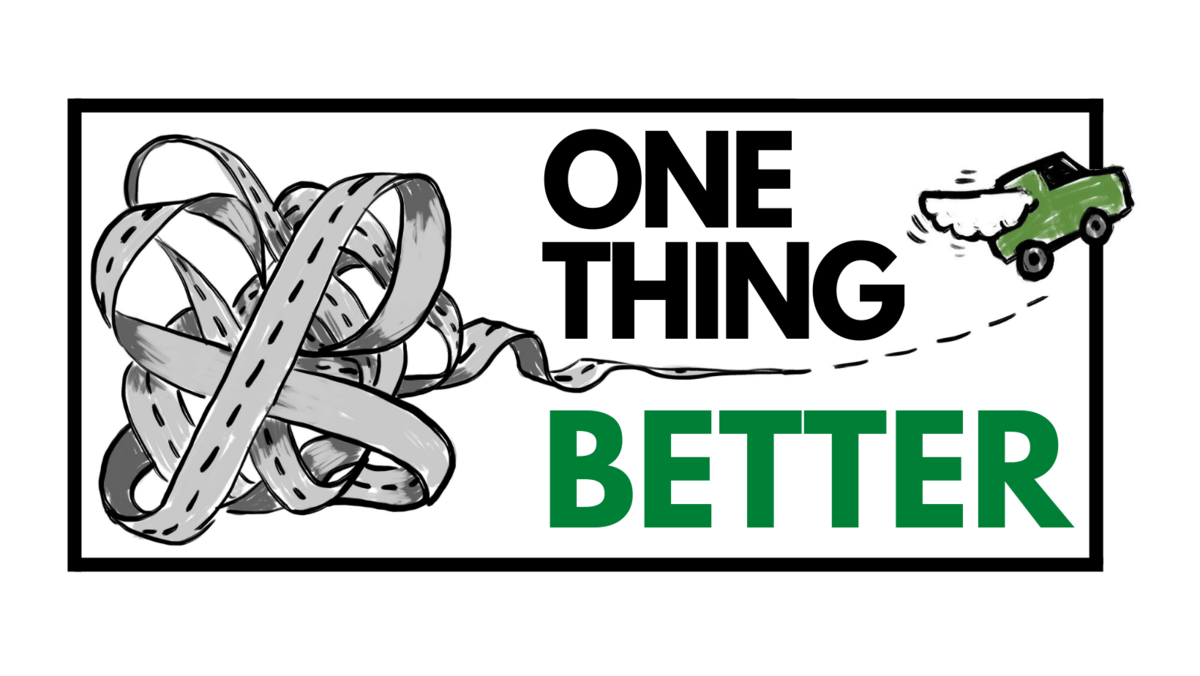- One Thing Better
- Posts
- Welcome. I'll make you more optimistic!
Welcome. I'll make you more optimistic!
What this newsletter is all about, and how it'll help you focus on what matters.

Optimism can be strangely lonely.
I’m writing this newsletter to change that. Build For Tomorrow is designed to help you feel more optimistic and empowered about the future. It shows ways to be forward-thinking and to identify opportunity in change. It is meant to shift perspective. It is meant to put your worries in context — to reveal how normal they are, but also how overblown.
This doesn’t come naturally to me. I grew up as an angsty, skeptical, punk rock kid. Then I turned into an angsty, skeptical journalist. I aimed to tear a lot of stuff down. But then a few things happened: As editor in chief of Entrepreneur magazine, I started spending a lot of time with entrepreneurs, who are relentlessly solutions-oriented. Through my podcast, I started studying the history of innovation, and I discovered how people once pushed back against basically everything we think of as good — from the teddy bear to the novel! Soon, my inherent skepticism got turned in on itself. I started to become skeptical of the skeptics; I started to wonder whether their arguments were based in fact, or just feeling.
Most importantly, as I started to express these things, I started to realize how optimism clears a path forward. Then I started to see how it could impact others, like this guy who just DM’d me on Twitter about my work.

This is now my goal — to help everyone feel like this.
So why is optimism often lonely? You’d think that optimism is the easier, more welcome path. Who doesn’t want to feel good? Who wouldn’t be attracted to positive and empowering thinking? That’s what I thought as I embarked upon this work!
But I have repeatedly seen pessimism attract a larger crowd. Media outlets are generally more driven by stories of fear than stories of progress. Twitter thrives off the negative. Newspapers have repeatedly rejected columns of mine about how our world is experiencing progress, and instead ran columns from other writers that make the exact opposite argument.
When I try to convince people that something will be fine — that you are not addicted to tech, that younger generations are not weaker and more entitled than older ones! — people push back. An example: I spent a month digging into the history of participation trophies, discovering that — contrary to the narrative that they are new and destroying our youth — they are actually 100 years old and have no negative psychological impact on young people. And what was the response? A bunch of this:
@RadioFreeTom But here’s the thing: Your generation got participation trophies too. They’ve been around for 100 years and only recently declared bad. Listen to this—I hope it adds perspective to what you’re saying here link.chtbl.com/bft-trophy
— Jason Feifer (@heyfeifer)
5:08 PM • Mar 28, 2021
I don’t see how this is helpful or even appealing. If you believe that a generation is doomed because of a trophy, or that technology is so addictive that you are helpless against it, or that there are no possible solutions to our problems, then you are setting yourself up for nothingness. What can you do? Nothing. Who can you help? Nobody.
The great writer Nir Eyal describes this as “learned helplessness” — that these messages teach us to be helpless, and to not think of solutions, and to not even be open to the possibility that we can help ourselves. We must then turn to others for help, which of course means we are attracted to the people who tell us negative stories, because those are the stories that feel truest.
Is this how pessimism attracts a crowd? Perhaps.
But that crowd doesn’t interest me. Their worries are repetitive. Their questions are boring.
That’s not to say I advocate for blind optimism. We have problems, and we should address those problems! But there are always problems. The existence of problems does not mean we have failed, or that we are unable to progress forward.
Optimists like the Harvard experimental psychologist Steven Pinker pose a helpful way to think of this. They ask, “Are our new problems better than our old problems?” I find this to be a clarifying way of thinking about complex subjects. Industrialized food is a classic example: It is rightly criticized for promoting unhealthy food, but it also significantly helped reduce global starvation. So are our new problems better than our old problems? Yes — we are now able to feed more people, and can focus on the challenge of feeding them better.
To me, that’s optimism. It isn’t ignorant of problems, but it puts them in the right context and embraces the potential for practical solutions.
Twice a week, that’s the attitude I’m going to bring you in this newsletter. I will draw from entrepreneurs, history, science, news, and more, all to help calibrate your mind in a more optimistic, opportunity-focused way. We will learn from the past but not anchor ourselves to it, and get down to the important business of using our time today to its greatest effect: We will look forward.
We will build for tomorrow.